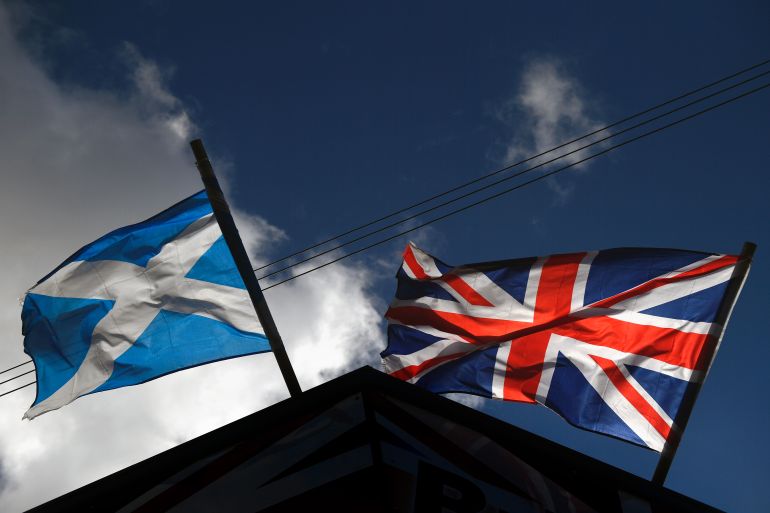Independence for Scotland is not an exclusively Scottish issue
The demand for another referendum has sparked a debate about what kind of country the UK truly is.

On Tuesday afternoon, Scottish First Minister Nicola Sturgeon once again brought the issue of Scottish independence – and the two souls of the movement for its realisation – into the debating chamber at Holyrood, Scotland’s semi-autonomous parliament in Edinburgh.
The Scottish National Party (SNP) leader has for a long time wanted to stage a second referendum on the breakup of the British state.
She has now set a date.
The new plebiscite will take place on October 19, 2023, Sturgeon said, and between now and then her devolved administration – a coalition between the politically dominant SNP and the smaller, more radical Scottish Greens – will set out the substance of Scotland’s sovereignty in a series of detailed prospectus papers.
Yet, as Sturgeon acknowledged in her statement, the UK government under the leadership of Boris Johnson has thus far shown zero willingness to negotiate with Edinburgh on the legitimacy, let alone the timing, of a fresh vote.
As a result, Edinburgh may be forced to go at it alone – which will happen, Sturgeon announced, if the UK Supreme Court decides that Holyrood has the legislative authority to organise a consultative poll, with or without the explicit consent of the British political class in London.
If, however, the Court rules against Holyrood and affirms that ultimate constitutional power in the UK’s jerry-built political system lies with Westminster (as most experts assume it will), then the SNP will turn the next UK general election, scheduled for 2024 or 2025, into a single-issue contest, anchored around one powerfully resonant question: “Should Scotland be an independent country – yes or no?”
The movement Sturgeon leads has always wrestled with a compound identity.
The first part of that identity – embodied by Sturgeon herself – is hyper-cautious and institutional. The institutional segment of the SNP wants the process by which Scotland eventually exits the UK to be clear, uncontested, and internationally agreed. The centrepiece of the party’s pitch to moderate Scottish voters is independent membership of the European Union – an outcome that will only be possible if Scotland’s ties to the UK are dissolved democratically, without descent into a painful, Catalan-style deadlock.
The second part of the independence movement’s psyche is attritional and populist. Sturgeon – a lawyer by training – is less comfortable with this tendency, but the SNP’s base has grown restless since England and Wales opted for Brexit six years ago and independence activists now view British Conservative rule in Scotland as an intolerable imposition on the country’s national politics.
In her statement this week, Sturgeon tried to balance these conflicting impulses.
Her preference is for Johnson to allow another referendum to take place on precisely the same terms as the initial independence vote in September 2014, which resulted in a 55 percent to 45 percent victory for the pro-UK camp.
If this scenario does not materialise, she would like the British Supreme Court to acknowledge Holyrood’s right to legislate for a poll in the absence of London’s approval.
Failing that, Sturgeon will embrace Scottish nationalism’s most disruptive instincts and campaign in two years’ time for a near-unilateral severing of ties between Scotland and Westminster.
None of these options is risk-free for the SNP.
Assuming that the Johnson cabinet continues with its obstructionist strategy and the Supreme Court is unmoved by Scottish legal appeals, the party will be forced to bet its entire political future on a comprehensive sweep of Scotland’s Westminster seats 24 months from now.
And even then, in the event of an overwhelming nationalist win, Westminster may not shift position, leaving Sturgeon with an awkward, if not intractable, dilemma: should she try to extract Scotland from the Union extra-legally, with all the procedural and democratic pitfalls that would entail, or should she simply double-down on her – until now glibly ignored – demands for a mutually agreed settlement?
Sturgeon’s forceful answer to this question is that independence for Scotland is not an exclusively Scottish issue. The challenge she has laid in front of the Supreme Court relates to the nature of British democracy.
Is the United Kingdom a consensual union of equal nations? Or is it, crudely, a mechanism for English control over the Celtic peripheries?
On the basis of Johnson’s shambolic three-year reign as prime minister, democracy is not currently one of the ranking concerns in the Conservative Party’s list of priorities.
This is, after all, the man who sought to prorogue the UK parliament in order to wedge through a Brexit deal that Scotland voted overwhelmingly against.
At the same time, the Tory leader, a politician permanently beset by scandals and allegations of gross misconduct, may not be around all that much longer – and it is possible that the next occupant of Downing Street will be more amenable to Edinburgh’s requests for compromise.
The end of the UK may not be any closer this week than it was last. But by seeking clarity on Scotland’s legal and constitutional standing within the Union, Nicola Sturgeon has sparked a debate about what kind of country the UK is.
In other words, she has not just evoked competing accounts of what it means to be a Scottish nationalist, but what it means to be a British one, too.
The views expressed in this article are the author’s own and do not necessarily reflect Al Jazeera’s editorial stance.
